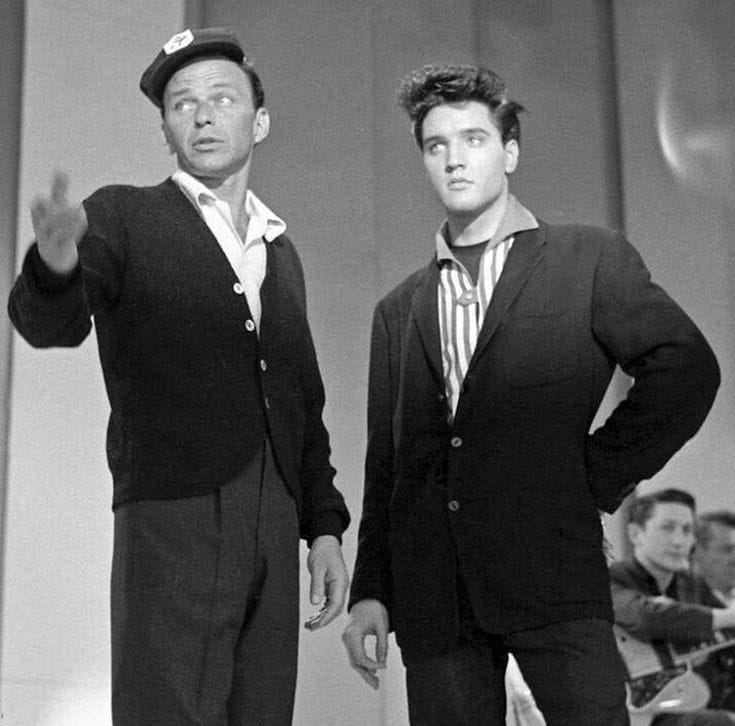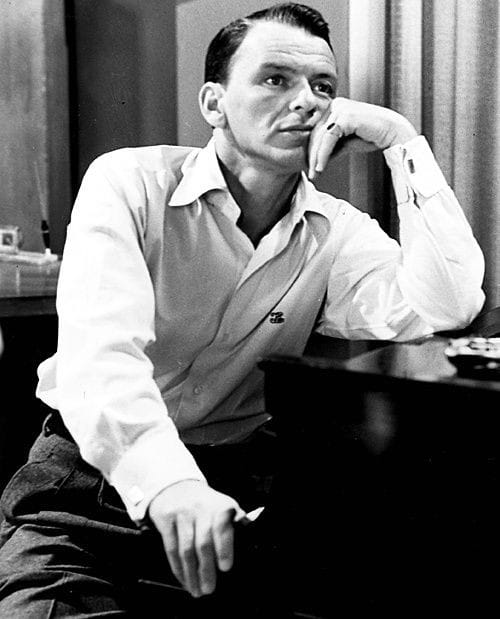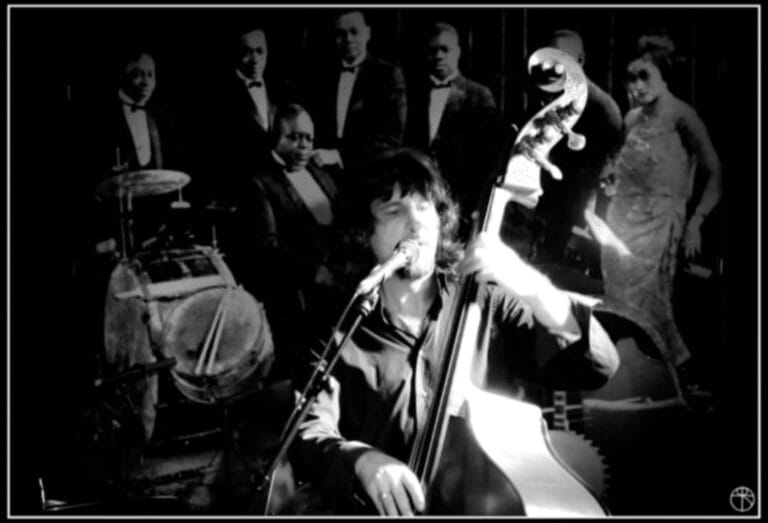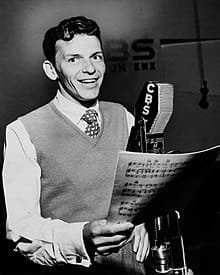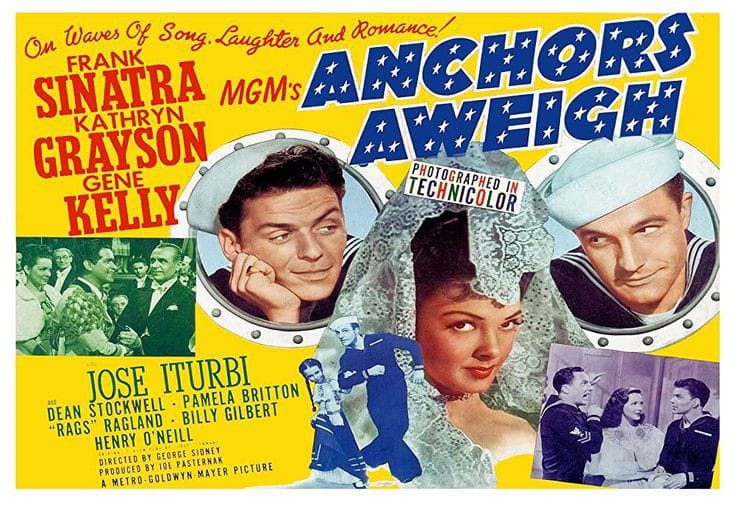
“Anchors Aweigh: A Dazzling Musical Voyage with Sinatra and Kelly”
“Anchors Aweigh” (1945) Part One
Although Frank had already appeared in four feature films, it can be said that Anchors Aweigh was his true breakthrough in cinema, backed by the most important studio of the time, a high budget, and a stellar cast.
But Anchors Aweigh is much more than that; it is one of the classic musicals in film history and has not lost an ounce of the charm or historical and cultural value that captivated the world eighty years ago.
Historical Context
In 1944, Frank Sinatra was the talk of the town—for better or worse. The title of his recently released film with RKO, Higher and Higher (1943), perfectly described the trajectory of his career, especially considering that just nine years earlier, he had been working as a chauffeur for amateur bands in Hoboken and singing in exchange for sandwiches and cigarettes. Now, there was nothing he wasn’t excelling at: his records were selling like hotcakes, his live performances stirred an overwhelming emotional response among his devoted teenage fans, and Higher and Higher had drawn attention to his acting potential.
However, not everything was a success. He faced criticism for not enlisting in the military during World War II, something major stars like James Stewart and Clark Gable had done. The truth was that Sinatra had wanted to contribute to the war effort but was rejected due to a perforated eardrum, a birth injury caused by the forceps used during his delivery.
In January 1944, he performed at a benefit concert for the Jewish Home for the Older People in Los Angeles. The highlight of his performance was a deeply moving rendition of Ol’ Man River, the classic song by Jerome Kern and Oscar Hammerstein II, written in 1927 for the musical Show Boat. Among the audience, the relentless Metro-Goldwyn-Mayer studio head Louis B. Mayer was unable to hold back tears at Sinatra’s superb performance. Mayer had an undeniable gift for discovering talent and turning them into stars—he had propelled the careers of Greta Garbo, Judy Garland, Joan Crawford, Mickey Rooney, and Clark Gable, among many others. After composing himself, Mayer turned to his assistant, Eddie Mannix, and said, “I want that boy.”
Sinatra had previously worked with MGM a couple of years earlier, singing with Tommy Dorsey’s orchestra in the Eleanor Powell comedy Ship Ahoy, though Mayer may never have seen the film.
Now, however, the mogul had his full attention on his new protégé. In February 1944, he signed Sinatra to a lavish five-year contract, instantly making him MGM’s new golden boy. His initial salary was $130,000 per film (equivalent to nearly $2,300,000 in 2025), six times what he had been earning at RKO. The contract included clauses accommodating his busy schedule of recordings and live performances, granting him publishing rights to some of the music from his films, and, according to several sources, applying the studio’s strict morality clause more leniently toward him. This clause required actors to maintain an impeccable public image to protect both their own reputation and that of the studio. This leniency proved beneficial for Sinatra, whose irresistible womanizing tendencies and short temper with intrusive journalists could have otherwise been costly.
In return for such privileges, Frank had to prove he was up to the challenge—and, as we’ll see later, he spared no effort to do so.
Origins
The screenplay was written by Isobel Lennart, based on a story by Natalie Marcin. Lennart later penned excellent scripts for Love Me or Leave Me (Charles Vidor, 1955) and Funny Girl (William Wyler, 1968), her most celebrated work. Within Sinatra’s filmography, she also contributed to the scripts for It Happened in Brooklyn (1947) and The Kissing Bandit (1948).
The Stars
Gene Kelly (1912–1996) made his film debut in For Me and My Gal (1942). His work as an actor and choreographer in Cover Girl (1944) opened the door for him to choreograph the dances in Anchors Aweigh. Over his brilliant career, he transformed how dance was presented on screen. An American in Paris (1951) and Singin’ in the Rain (1952) not only became iconic films but also left an indelible mark on cinema history. Kelly and Sinatra co-starred in two more musicals: Take Me Out to the Ball Game and On the Town, both released in 1949.
Kathryn Grayson (1922–2010), an actress and opera singer, was signed by MGM in 1940 to replace her counterpart Deanna Durbin, who had left the studio for Universal. Grayson had made her film debut in Andy Hardy’s Private Secretary (1941), and her role in Anchors Aweigh marked her return to the screen after nearly two years devoted primarily to performing for U.S. troops. Her career in film, theater, and music spanned more than fifty years. She later reunited with Sinatra in Till the Clouds Roll By (1946), It Happened in Brooklyn (1947), and The Kissing Bandit (1948).
Dean Stockwell (1936–2021) gained recognition in The Valley of Decision, a film released shortly before Anchors Aweigh. These were the first steps in a seventy-year career that included roles in Dune (1984), Blue Velvet (1986), and Married to the Mob (1988), for which he was nominated for an Oscar for Best Supporting Actor.
Pamela Britton (1923–1974) began her career on Broadway before making her film debut in Anchors Aweigh. Apart from her role in D.O.A. (1950), she had a relatively modest Hollywood career. Her most memorable performance was as Lorelei Brown in the television series My Favorite Martian (1963–1966).
José Iturbi (1895–1980) was a Spanish pianist from Valencia who began playing at the age of three. He moved to the United States in the late 1920s and earned a stellar reputation among audiences and critics. By 1937, he was one of the five most highly regarded conductors. His film appearances, in titles such as Holiday in Mexico (1946) and That Midnight Kiss (1949), helped bring classical music to mainstream audiences, and he continued to perform for packed concert halls until the end of his career.
Plot
Clarence Doolittle (Frank Sinatra) and Joseph Brady (Gene Kelly), two sailors on leave in Hollywood, meet actress and singer Susan Abbott (Kathryn Grayson), who lives with her young nephew Donald (Dean Stockwell) and dreams of making it in the movie industry. Joseph, skilled with women, helps the shy Clarence win over Susan, but in the process, she and Joseph fall in love, while Clarence becomes enamored with Brooklyn (Pamela Britton), a charming waitress. At the same time, Joseph and Clarence try to help Susan land an audition in Hollywood with the famous musician José Iturbi.
Article written by Mahnuel Muñoz. Facebook group “Al Mal Tiempo, Frank Sinatra“. https://www.facebook.com/groups/120950148274703
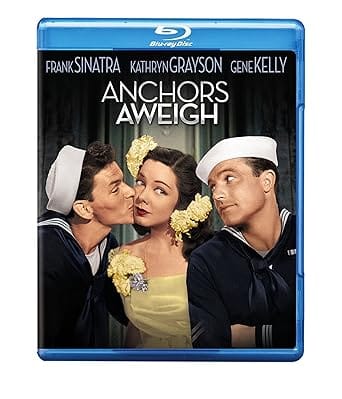
Access the Complete Filmography of Frank Sinatra in the following link of Sinatra Radio 24h https://sinatraradio24h.com/category/filmography
We remind you that you can also listen to Sinatra Radio 24 hours on your mobile phone by downloading our free applications for Android in the Play Store https://play.google.com/store/apps/details?id=sinatra.radio24h for iPhone in the Apple Store https://apps.apple.com/app/sinatra-radio-24h/id6599859344


